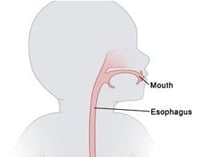Esophageal Motility Study (General Anesthesia)
Your child has been scheduled for an Esophageal Motility Study at Children's Wisconsin.
The study will be on ___________________ at ____________________ a.m. / p.m.
- A nurse from Day Surgery will call you 2 to 3 days before the test.
- When you get to the hospital, go to Day Surgery on the 3rd floor of the main hospital. (414-266-3536)
What is esophageal motility?
This study measures pressures in the esophagus both at rest and when swallowing. It is done for a child who chokes when eating or has problems with food getting stuck when trying to eat. The study is done to see if the nerves and muscles are working together as they should.
How is the study done?
Your child will be given general anesthesia. Once asleep, a tube called a catheter is put into your child’s nose. It is then gently moved into the stomach. Your child will return to day surgery after the catheter is in place. When your child wakes up from anesthesia they may be taken to radiology or the motility room for the motility study. Or the motility study may be done in Day Surgery. The motility team will discuss this with you.

The catheter is flexible and has many sensors. The sensors in the catheter monitor pressures in the esophagus. As food and liquid move down the esophagus the pressures change. The tube is connected to a computer to record the pressure. The tube may be pulled part way out and put back in again 2 to 3 times. Most often, the study lasts between 30 and 60 minutes. Sometimes the study is longer and there are extra steps. If this is needed, the motility team will talk to you about it. The tube is then removed, and you and your child may go home.
During the test:
- Your child will be given small sips of a salt water solution.
- Your child may be asked to eat a small amount of bread, crackers or some other food. We will talk with you about your child’s diet ahead of time.
- X-rays may be done during the test. For these X-rays, your child will need to drink a barium solution. The solution is like the one given for an upper GI X-ray.
What needs to be done before the test?
Please note: It is important that you follow these special instructions. If your child eats or drinks anything after the times Day Surgery tells you, the test may be cancelled. A nurse from Day Surgery will call you 2 to 3 days before the test to:
- Check the current health of your child. Your child should not have a fever, cold or other illness.
- Remind you what time your child must stop eating and drinking.
- They may have clear liquids until noon before the procedure, unless the Day Surgery nurse gives other instructions.
- Tell you what time to come to the hospital. Please remember, the time you were given when the test was scheduled is an estimate. The schedule can change at any time. Most of these tests will be on time.
If your child has diabetes or other health problems, please contact your doctor or clinic about this test as soon as it is scheduled.
Your child's stomach needs to be empty before this test can be done. Your child should not eat any solids or liquids after the catheter is placed until after the study is done. If your child is having other tests or procedures, someone will talk with you about those instructions.
A motility nurse will call you 7 days before the test to go over any special instructions.
When will I know the results?
Early results will be discussed with you after the test is done. It may take a week or two for doctor’s to review the test recordings and have final results. You will be called if the final results differ from the early results. A letter will be sent to the doctor who requested the test.



